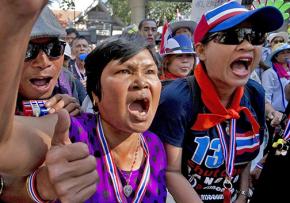The future of Thai democracy
In late November and early December, Thailand's capital of Bangkok was rocked by unrest as protesters, ostensibly seeking to curb the influence of former Prime Minister Thaksin Shinawatra on the government of the current prime minister, Thaksin's sister Yingluck Shinawatra, clashed with riot police and briefly broke into Army headquarters.
The demonstrations, led by Suthep Thaugsuban, a high-ranking member of Thailand's pro-military Democrat Party and former deputy prime minister under Abhisit Vejjajiva, continued into February--even after the prime minister dissolved parliament and called elections for early February in an attempt to defuse the crisis and restore legitimacy to the government.
Between 2006 to 2011, the Democrat Party, which has its base in the middle and upper classes in southern Thailand, was twice placed in power following coups by the Thai military. Using populist rhetoric and complaints of corruption to mask anti-democratic policies, those behind the protests have targeted Yingluck and the Puea Thai Party--which is associated with Thailand's pro-democracy "Red Shirt" movement.
The Democrat Party, which has not won an election in more than two decades, boycotted the February elections. Protesters used violence to block hundreds of thousands of voters from going to the polls for advance voting on January 26—and to stop the delivery of ballot boxes to polling places for the general election on February 2.
is a Thai dissident who lives in exile today. Faced with charges of the supposed crime of "lese majesty"--essentially, not being loyal to Thailand's head of state, King Bhumibol--and a possible prison sentence of 15 years, he fled the country in 2009. Here, he comments on the prospects for democracy in Thailand in the wake of the elections.
THE FEBRUARY 2 election cannot solve the Thai political crisis, because those lined up against the government and the holding of democratic elections are fundamentally opposed to democracy.
The election was marred by violence from Democrat Party thugs who were determined to prevent the election taking place. Armed thugs fired automatic weapons into crowds of people who were expressing their wish to vote. These thugs have been enjoying total impunity for over a month while intimidating voters and candidates.
Democrat Party leaders such as Sutep [Thaugsuban], Satit [Wonghnongtaey] and Abhisit [Vejjajiva] want the electoral process to be changed so that the middle class and the elites can have an absolute veto over the views of the majority of the electorate. Democracy doesn't work for them because they only have support from less than 30 percent of the population. They are supported in their thuggery by the Constitutional Court, the top civil service, the mainstream media, sections of the Electoral Commission and the NGOs.

The military is happy to stand by and watch Yingluk and Puea Thai's discomfort. They may not want to stage a coup right now, but they will not lift a finger to defend democracy and the election. They want Yingluk to make more concessions to those who are opposed to democracy.
Despite the violence and intimidation, voting took place in most provinces and 20.4 million people cast their votes. This compares to 35 million in 2011. Given that the Democrat Party has in the past won no more than 14 million votes, and that in this election, they called for a boycott, the turnout was not too bad. It can be assumed that more than 20 million people wish to preserve democracy, and many of those support Puea Thai.
No amount of compromise or negotiations with the anti-democratic thugs will solve the crisis. The only short-term result would be shrinkage of the democratic space and the further empowerment of those who view the majority of the electorate with contempt.
No amount of outrage at the violence and impunity of the thugs will push Yingluk or Puea Thai or the authorities into a crackdown on those committing criminal acts. As I mentioned in a previous article on permanent revolution in Thailand, Yingluk would rather do a dirty deal with Sutep than to mobilize the Red Shirts and the general population to fight for democracy.
This means that pro-democracy activists, whether they be progressive Red Shirts, pro-democracy trade unionists, White Shirts, Nitirat supporters, socialists, or members of the Forum for the Defense of Democracy, all have to work together to prevent the destruction of the democratic space. They should also push forward with real reform proposals which will increase rights and the empowerment of the majority.
The future of Thai democracy lies in their hands.
First published at Red Thai Socialist.


